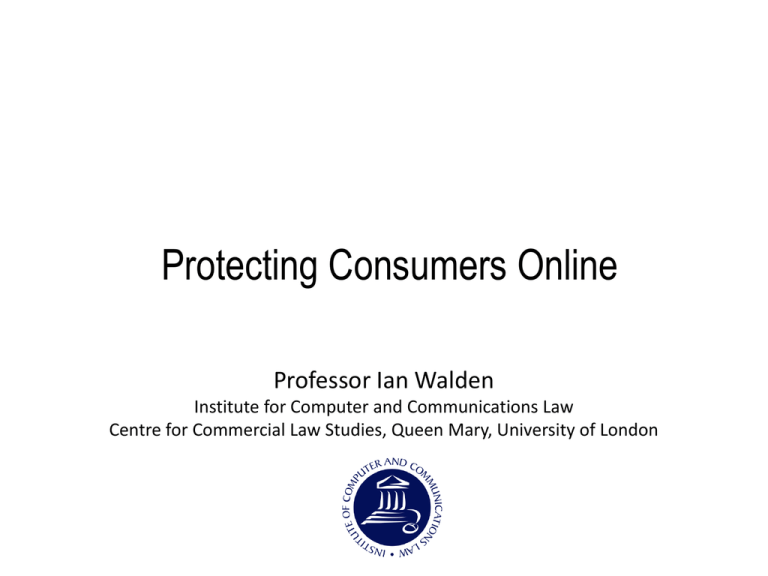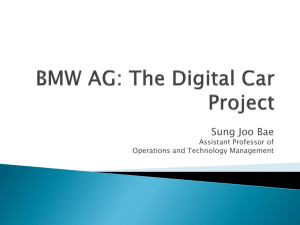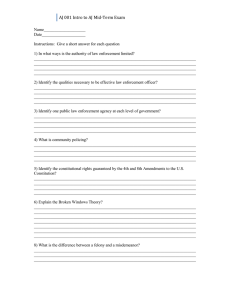Protecting Consumers Online Professor Ian Walden
advertisement

Protecting Consumers Online Professor Ian Walden Institute for Computer and Communications Law Centre for Commercial Law Studies, Queen Mary, University of London Introductory Remarks • • • • • • The ideal of the informed consumer v. anonymity of the Internet Different consumer protection standards & different cultural expectations Consumer redress on the Internet Safety, security & trust Cheap marketing & spam Social exclusion issues Scope • Protected persons: ‘Consumer’ – EU: “any natural person who…. is acting for purposes which are outside his trade, business, craft or profession” – T&T: “any person… as the end user of the goods or services offered by the supplier” – Barbados: “intended for private use or consumption” but not for commerce • Regulated transactions – ‘distance contract’ or ‘using electronic means’ – Goods, services and products • ‘digital content’: “data which are produced and supplied in digital form” Substantive Law • Regulation of advertising and marketing • • • • • • decency, legality & truthfulness certain products: e.g. tobacco, alcohol, medical products marketing to children trade descriptions, price indications, weights & measures and transparency generally marketing techniques, e.g. inertia selling restrictions on certain sales promotions Substantive Law • Control of ‘unfair’ contract terms in contracts • • Presumption: the consumer is weak in both his bargaining power and his level of knowledge Unfair as to issues of…. • • • Substance, e.g. terms deemed invalid (indicative list) Form: e.g. plain intelligible language, incorporation & click wrap Exclusion of liability Substantive Law • Quality and safety of consumer goods – – Satisfactory quality, conformity with description, fitness for purpose (seller) Product liability (producer) • • Required to evidence causation, but not fault Regulation of consumer credit – – Formalities: ‘in writing’ Joint liability with supplier for defects eCommerce laws • Accurate & up-to-date information • • “prices are valid until [date]. For a free price list after that date email us at [email address].” Information requirements • • • • • name and details of supplier; company name supplier’s geographical address & email address supplier’s company registration & VAT number authorisation by or membership of professional bodies T&T: ‘sufficient to allow…service of legal process’ eCommerce laws • • • • • main characteristics of goods price of goods, including all taxes and delivery costs arrangements for payment, delivery and performance consumer’s right to cancel and cancellation procedure Form requirements • • EU: in a ‘durable medium’ – accessible for future reference T&T: “to maintain an adequate record of the information” eCommerce laws • Contract formation (if website) • duty of supplier to give consumer opportunity to spot errors and to correct them • • See also UN Convention (2005), Art. 14 acknowledgement of receipt of order eCommerce laws • Redress • • • • Right to cancel the contract within a certain deadline (7 days/14 days) Terms of sales promotion must be clear Fraudulent abuse of payment cards • • • T&T: right of rescission within 30 days consumer’s right to cancel payment/get reimbursed supplier (and payment provider) bears risk Delivery/performance within 30 days Jurisdiction & Enforcement • Enforcement of consumer protection legislation – – – • right of action for public bodies and consumer bodies criminal penalties & criminal prosecution contractual or tort liability (civil damages) Enforcement in the international context (across a border) – which country is competent to apply its regulation? Jurisdiction & Enforcement • Enforcement if supplier has no assets or is not present in the prosecuting jurisdiction – • bad publicity? Enforcement depends on co-operation between national enforcement authorities – – – extradition treaty? treaty on enforcement & recognition of civil judgements? ad hoc? Jurisdiction & Enforcement • International co-operation, harmonisation and complaints bodies – International Consumer Protection and Enforcement Network (ICPEN) – Econsumer.gov – OECD • “Guidelines for Consumer Protection in the Context of Electronic Commerce” (1999) –under revision Self-Regulation & ADR • Problem of overlapping…. – – • regulatory competence enforcement Self-regulation – – trustmark schemes ADR schemes • Trusted Shops • BBB Online Trustmark Schemes • How does it work? – – – – – – Code to which supplier voluntarily subscribes Substantive consumer protection standards Complaints procedure Trust mark (branding) in conjunction with code Sanction for non-compliance: withdrawal of code Complaints procedure • • to supplier to trade association/consumer association Alternative Dispute Resolution • Non-judicial dispute resolution – • • • • • arbitration, mediation, mock trials, evaluation, credit card charge back More flexible, cheaper & more creative Better suited to cross-border disputes Use of technology: online dispute resolution Who pays? Independence? Voluntary co-operation; non-coercive Self-Regulation & ADR • • • • • • Solves problem of overlapping jurisdictions and lack of consumer redress Creates minimum international standards and some certainty for suppliers Enhances consumer trust in E-Commerce But how effective are these schemes? Multifarious schemes confusing and not transparent Democratic deficit? Unsolicited Contact • Conduct: ‘unsolicited calls’, ‘supply’, ‘services’, ‘commercial communications by electronic mail’ – • Expression concerns Problem of SPAM – – how is it sent? legislative reaction • • – – US: CAN-SPAM Act T&T: option to opt out or commit an offence out-in, opt-out how to protect against • technical regulation Electronic payments • Need for instantaneous remote transfer of funds at low cost – Credit cards – Digital cash / electronic money, e.g. MPesa • Card-based or software-based • Pre-paid mobile telephony? • Consumer protection issues • Regulated providers Concluding Remarks




